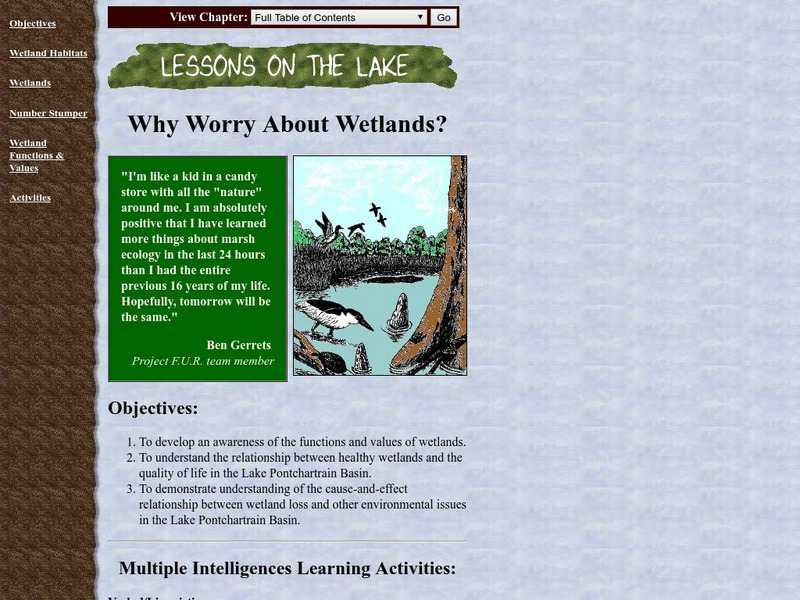Alabama Learning Exchange
Alex: Habitats
What is a habitat? In this instructional activity, students will identify that a habitat has four elements, food, water, shelter, and space. Students will identify their own habitat and create a brochure describing the habitat in terms...
Science Education Resource Center at Carleton College
Serc: Macroinvertebrates and Indicators of Water Quality
During this field activity, students will examine different aquatic habitats, collect and identify macroinvertebrates from each and use an index to determine water quality. They will also be able to explain the meaning of tolerant and...
The Franklin Institute
The Franklin Institute Online: Slick Sea Spills
Use this site to promote environmental awareness in your classroom with this lesson on the effects of oil spills on water habitats.
American Geosciences Institute
American Geosciences Institute: Earth Science Week: Freddy the Fish
Explore how pollution can affect natural organisms and habitats.
Alabama Learning Exchange
Alex: Tad the Tadpole
Tad the Tadpole is designed to demonstrate how pollution in various areas affects wildlife in their native habitats. The lesson is designed to stress the importance of conservation for animals and their surrounding environment. Upon...
Nature Conservancy
The Nature Conservancy: From America's Rainforest to America's Desert
On this virtual field trip, teachers will help their students travel to the lush, rain-soaked splendor of the Olympic Peninsula and explore the urban watershed of Seattle. Next, they will head to Arizona's dry, desert landscape and take...
BSCS Science Learning
Bscs: Frog Eat Frog World
Using maps and graphs of large data sets collected in FrogWatch, students will determine the range, preferred land cover, and proximity to water of the American bullfrog to figure out the bullfrog's requirements for food, water, and...
TeachEngineering
Teach Engineering: Go With the Energy Flow
Learners learn about energy and nutrient flow in various biosphere climates and environments. They learn about herbivores, carnivores, omnivores, food chains and food webs, seeing the interdependence between producers, consumers and...
US Geological Survey
Lake Pontchartrain Basin Foundation: Why Worry About Wetland?
Help young scholars understand the functions and values of wetlands through these multiple intelligences learning activities. The site also includes information about the wetland habitats, commercial values, water quality, and erosion...
Other popular searches
- Animals Water Habitats
- Animal Water Habitats
- Land or Water Habitats
- Shallow Water Habitats
- Water Habitats Lesson Plans
- Describe Water Habitats
- Water Habitats Rivers







